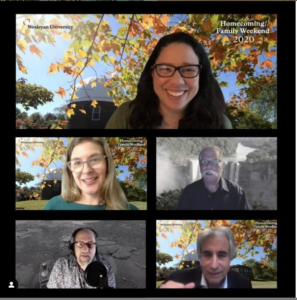
Each academic year, the COE gathers a small group of Wesleyan faculty members, a scholar of prominence from outside Wesleyan, and undergraduate students into a year-long academic think tank on a critical environmental issue. The aim of the COE Think Tank is not only to generate a deeper understanding of the thematic issue, but also to produce scholarly works that will influence national/international thinking and action on the issue. The Think Tank theme for 2020-21 is Habitability: Cosmological, Planetary & Ethical Perspectives.
 As part of the 18th annual Where On Earth Are We Going? Robert F. Schumann Environmental Studies Symposium, David Grinspoon and Martha Gilmore presented their talk, “Habitability and Life on Venus,” on October 17, 2020.
As part of the 18th annual Where On Earth Are We Going? Robert F. Schumann Environmental Studies Symposium, David Grinspoon and Martha Gilmore presented their talk, “Habitability and Life on Venus,” on October 17, 2020.